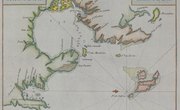Prominent Assyriologist Samuel Noah Kramer stated that unlike Sumerians, the Assyrians' predecessors who elected their kings in a democratic way, ancient Assyrians had a centralized despotic monarchy with imperial ambitions. This type of government was consistent during all periods of the Assyrian history, which lasted from approximately 1813 B.C. till 612 B.C., when the Empire centralized in modern-day Iraq finally fell.
Assyrian Ideology
Assyrian Imperialism had its roots in the official ideology of the religious origin. The Assyrians believed that their central deity Ashur (Assur) gave them a task to collect all the lands of the world under his aegis. Some Assyriologists believe Ashur had monotheistic features. The king was the high priest of Ashur, playing the role of administrator on behalf of the god, the commander in chief of the army and the determinant of domestic and foreign policy. The Assyrian regime can be called theocratic because the king gathered those lands which initially belonged to Ashur.
Assyrian Army
The coronation oath of the Assyrian kings had them vow to extend the land's dominions, and they were expected to lead their armies, in person, on annual campaigns. The Assyrians created the strongest army of antiquity, which was surpassed only by the Roman army. In the beginning, it consisted of Assyrian peasants who had been called up for the periods of war. Later it became more professional, including mercenaries from the regions conquered by the Assyrians.
Centralization of Power
Having its heartland in the modern northern Iraq, Assyria occupied huge territories, covering almost all the Fertile Crescent. The Neo-Assyrian Empire was especially powerful from the 10th to the 7th century B.C. King Tiglath-Pileser III, mentioned in the Old Testament, established an effective communication network with all parts of his realm through a system of messenger relay stations. Also he had his representatives in the courts of all the vassal nations who were responsible for the realization of the Assyrian interests, including a permanent flow of tribute.
Terror as a Main Feature of the Assyrian Regime
The Assyrians were known for their extraordinary cruelty. They maintained the unity of the empire by perpetrating horrible atrocities and practicing forced emigration of rebellious populations to other parts of the empire. Terror was the most effective instrument at the disposal of the Assyrian governments. But unprecedented territorial expansion weakened Assyria and in 612 B.C. it was conquered by the allied armies of its southern neighbor Babylon and the Medes. Its capital Nineveh, Ashur and other cities were destroyed.
Related Articles
References
- "Cradle of Civilization"; Samuel Noah Kramer
- "The Ancient Assyrians"; Mark Healy & Angus McBride
- "The Assyrians and the Babylonians"; Alfredo Rizza
Writer Bio
Tatsiana Amosava has been writing professionally on culture, gender studies, education and philosophy since 2000. She also published her book "Linguistic Capital as a Source of Symbolic and Economic Profit." Amosava has Bachelor of Arts in sociology from Belarusian State University, a Master of Arts in regional studies from Moscow State University and a Master of Arts in Jewish history from University of Southampton.











